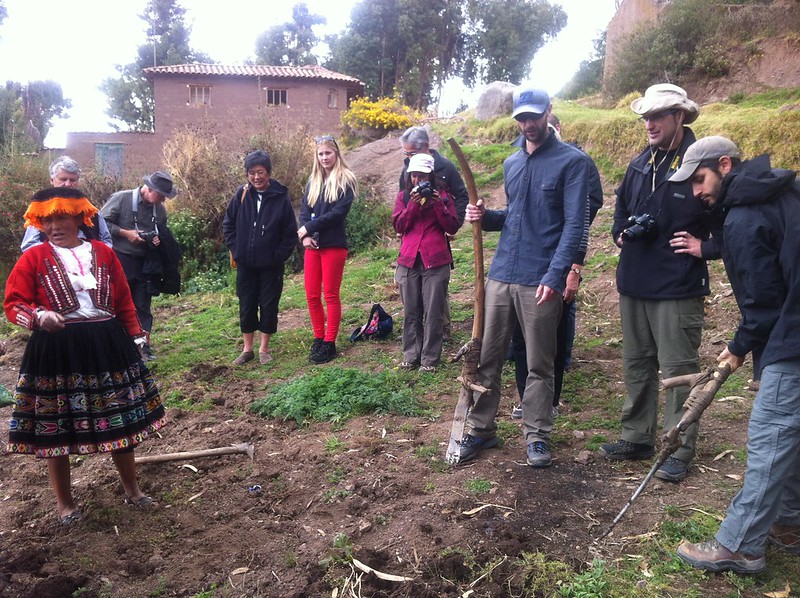IFAD Projects in Peru
 The International Fund for Agricultural Development (IFAD) is a global organization that seeks to reach the most remote locations and transform agriculture, rural economies and food systems. Rural farmers face many challenges that prevent them from escaping poverty, including limited education, limited influence on policies and environmental degradation. The IFAD recognizes these obstacles and its mission statement has solutions and goals for rectifying them. Providing training in modern farming techniques, supporting farmer’s organizations and promoting sustainable land practices are just some of the things that the IFAD is trying to further develop in rural areas.
The International Fund for Agricultural Development (IFAD) is a global organization that seeks to reach the most remote locations and transform agriculture, rural economies and food systems. Rural farmers face many challenges that prevent them from escaping poverty, including limited education, limited influence on policies and environmental degradation. The IFAD recognizes these obstacles and its mission statement has solutions and goals for rectifying them. Providing training in modern farming techniques, supporting farmer’s organizations and promoting sustainable land practices are just some of the things that the IFAD is trying to further develop in rural areas.
Peru is one of the countries that is struggling with poverty and poor living conditions in its rural areas, specifically the southern highlands. Since 1980, the IFAD has provided Peru with nine separate loans totaling $144 million. Additionally, it has initiated several public competitions in Peru to encourage innovation in exchange for a monetary prize. Recently, IFAD has concentrated on three projects in Peru aimed at reducing rural poverty.
Strengthening Local Development Project
Running between 2013 and 2019, this IFAD project worked with a $20 million loan to increase the overall well-being of the rural population by encouraging farmers to form producer associations (PA): groups that work together to leverage resources and tackle common challenges. Researchers found that households joining a PA increased their income, asset ownership and social involvement throughout this project. More financial resources, as well as increased opportunities for collaboration, directly benefited 15,900 households.
Project for Markets and Rural Development
Focusing primarily on women and young people, this IFAD project closely worked with 20,000 rural households and offered support to lift them out of poverty. Preserving cultural heritage is connected to lower rates of poverty because there is stronger community cohesion, which means that there are collaborative, more successful efforts to address local economic challenges. This project recognized this correlation and found ways to preserve culture in the Northern Highlands region of Peru. By contracting technical assistance, the IFAD taught artisans better techniques for making traditional crafts, which ensured that the crafts were high quality and profitable while still maintaining their cultural importance. Similarly, by promoting savings and micro-insurance, the IFAD made sure that rural people were economically secure, allowing them to spend time on cultural practices and pass them on to younger generations.
Livelihood Diversification in the Highlands Project
The Quechua and Aymara families are native groups of Peru and a majority of them are living below the poverty line. The IFAD loaned $34.5 million to this project which directly benefited 15,000 poor, native households. This IFAD project was different from others funded by the same organization, as it had the unique feature of directly transferring funds to communities. This strategy allowed smaller farmers to contract technical assistance and obtain property rights to land. Therefore, farmers would have modern techniques to ensure quality products and have the opportunity to manage their savings. In addition, the project worked with local authorities from this region to create maps and models that would represent the natural resources. Detailed maps helped communities efficiently use resources like water, soil and minerals, which promoted sustainable farming while still increasing agricultural productivity.
Looking Ahead
IFAD’s initiatives in Peru illustrate the organization’s commitment to addressing rural poverty through targeted projects that empower local communities. By focusing on forming producer associations, preserving cultural heritage and promoting sustainable farming practices, IFAD has made significant strides in improving the livelihoods of rural households. These ongoing efforts have not only increased income and asset ownership but also strengthened community cohesion and resource management in Peru’s highlands.
– Sophia Manole
Sophia is based in Bellevue, WA, USA and focuses on Good News for The Borgen Project.
Photo: Flickr
